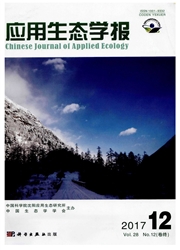

 中文摘要:
中文摘要:
以不同化感潜力分蘖洋葱为供体,黄瓜为受体,研究了分蘖洋葱根系分泌物对黄瓜幼苗生长、根际土壤微生物数量及细菌群落结构的影响.结果表明:不同化感潜力分蘖洋葱根系分泌物对黄瓜幼苗生长均具有促进作用,且随着浓度的升高,促进作用增强,相同浓度下,化感潜力强、弱供体之间差异不显著;不同化感潜力分蘖洋葱根系分泌物均增加了黄瓜根际土壤细菌和放线菌数量,降低了真菌和尖镰孢菌数量,化感潜力强的品种(L-06)效果更显著;不同化感潜力分蘖洋葱根系分泌物均能提高黄瓜根际土壤细菌群落丰富度,差异条带的序列片段经比对推测为3大细菌类群:Actinobacteria(放线菌纲)、Proteobacteria(变形菌纲)和Anaerolineaceae(厌氧绳菌纲),其中厌氧绳菌只出现在化感潜力强(L-06)的处理中.化感潜力强(L-06)、浓度高(10mL·株-1)的分蘖洋葱根系分泌物更有利于黄瓜根际土壤细菌群落丰富度的提高.
 英文摘要:
英文摘要:
Taking the Chinese onion cuhivars with different allelopathy potentials as the donor and cucumber as the accepter, this paper studied the effects of Chinese onion' s root exudates on the seedlings growth of cucumber and the euhurable microbial number and bacterial community struc- ture in the seedlings rhizosphere soil. The root exudates of the Chinese onion cultivars could pro- mote the growth of cucumber seedlings, and the stimulatory effect increased with the increasing con- centration of the root exudates. However, at the same concentrations of root exudates, the stimula- tory effect had no significant differences between the Chinese onion cultivars with strong and weak allelopathy potential. The root exudates of the Chinese onion cultivars increased the individual num- bers of bacteria and actinomyces but decreased those of fungi and Fusarium in rhizosphere soil, being more significant for the Chinese onion cultivar with high allelopathy potential (L-06). The root exudates of the Chinese onion cultivars also increased the bacterial community diversity in rhi- zosphere soil. The cloning and sequencing results indicated that the differential bacteria bands were affiliated with Actinobacteria, Proteobaeteria, and Anaerolineaceae, and Anaerolineaceae only occurred in the rhizosphere soil in the treatment of high allelopathy potential Chinese onion (L-06). It was suggested that high concentration ( 10 mL per plant) of root exudates from high allelopathy potential Chinese onion (L-06) could benefit the increase of bacterial community diversity in cu- cumber seedlings rhizosphere soil.
 同期刊论文项目
同期刊论文项目
 同项目期刊论文
同项目期刊论文
 Soil phenolics in a continuously mono-cropped cucumber (Cucumis sativus L.) system and their effects
Soil phenolics in a continuously mono-cropped cucumber (Cucumis sativus L.) system and their effects Allelopathic effects of root exudates of Chinese onion accessions on cucumber yield and Fusarium oxy
Allelopathic effects of root exudates of Chinese onion accessions on cucumber yield and Fusarium oxy Responses of soil microbial communities in the rhizosphere of cucumber (Cucumis sativus L.) to exoge
Responses of soil microbial communities in the rhizosphere of cucumber (Cucumis sativus L.) to exoge 期刊信息
期刊信息
